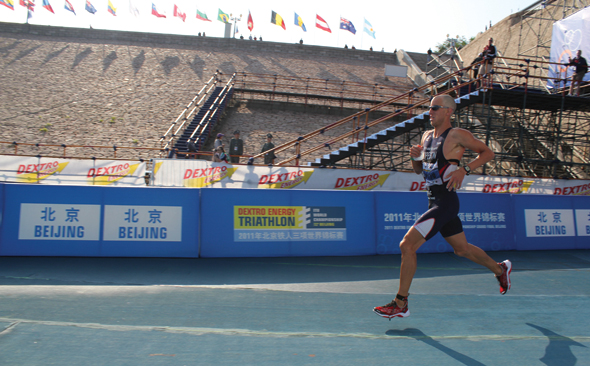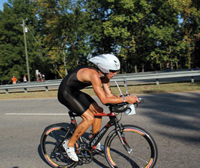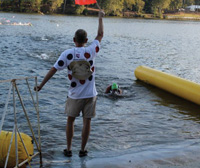alumni profile
By Land and By Sea
Spenser Popeson / Steinhardt ’08
by Brian Dalek / GSAS ’10

The morning of Spenser Popeson’s first competitive triathlon wasn’t ideal. After training for nine months, he awoke for the April 2010 Wilmington (North Carolina) Athletic Club Sprint Triathlon two-and-a-half hours late, thanks to a faulty alarm clock. This left little time to warm-up. Then he was positioned to start way in the back, behind weekend warriors and teens half his age who were simply out for the personal challenge. Popeson was racing for his career. Less than a year before, he’d given up a good job and much of his social life to begin chasing his dream of becoming a professional triathlete.

When the starting gun sounded, Popeson quickly moved past the pack, finishing an unexpected second in his debut triathlon. The only person to beat him? The man who would become the U.S. national champion in 2010.
For many, taking second in a competition that entails a 300-yard swim, an 11.5-mile bike ride, and a 3.1-mile run would seem a significant accomplishment. But it gnawed at Popeson. “I didn’t want to start accepting failure,” the 26-year-old says. “If I was going to do this for a living, second place wasn’t going to cut it.” That attitude led Popeson through grueling workouts and family tragedy to a divisional victory—just 17 months later—in the ITU Short Course Triathlon Age-Group World Championship held in Beijing in September 2011.
It’s not surprising that Popeson has found success as a triathlete. The tools were all there. As a runner, he had helped the NYU cross-country team win the 2007 NCAA Division III Cross Country National Championship. He also swam competitively from the age of 7 while growing up in Linwood, New Jersey, where he later surfed and worked as a beach lifeguard. That aptitude in the water gave him a more muscular six-foot-two, 163-pound build than the average distance runner, and has made him a prototype triathlete. Despite this, or the fact that the sport is booming—2.3 million people completed triathlons in 2010—Popeson knew it would be a stretch to earn enough prize money or sponsorship to cover living and training expenses. “I tell triathletes to think of [it] as a small business,” says Barb Lindquist, collegiate recruitment coordinator for USA Triathlon. “Plan on losing money in the first year, break even in the second, then make money in the third year and beyond.”

It was a risky move in a tough economy. Popeson’s communications degree had landed him a job promoting the Nike running brand along the East Coast at high schools and Nike events, but seeing elite runners regularly left him wanting more. “I would say, ‘I think I can do that,’ ” he remembers. His parents, Joanne and Dennis, were skeptical at first, but when they saw his commitment, they soon offered moral support. He quit working full-time, took on an assistant coaching gig at NYU, and found a professional trainer. “After two months of working with him, I knew this guy would get what he wanted,” says his coach, Marisa Carter. The two met at a Nike clinic in Raleigh in 2009, and Carter was immediately intrigued by Popeson’s tenacity. After that first Wilmington race, Popeson started prepping for the 2010 USA Triathlon National Championship in Tuscaloosa, Alabama.
But the biggest challenge Popeson would face came a month before the race, when his sister, Taylor, 21, who had suffered from bipolar disorder, suddenly died. “It did cross my mind that maybe I should stop for now and be with my family,” Popeson says, “but training was kind of how I coped.” And he says Taylor has always remained with him: “During my workouts or during my races, I’ll talk to her about how ‘I’m going to need you on this tough run.’ ”
Popeson’s dedication paid off. He finished fifth overall in Tuscaloosa,
making him eligible to represent the United States in Beijing as an amateur at the
Short Course (1-mile swim, 25-mile bike ride, 6.2-mile run) ITU
Triathlon Age-Group World Championship, where he took third overall among more than 1,000 athletes
and first in the men’s 25-29-year-old division. He was a world champion a year into his career, leaving little doubt
that he will formally turn pro in 2012. So with his initial dreams now achieved,
what’s next? “I just want to get faster,” Popeson says. “That’s my only goal.”
Popeson took third among more than 1,000 athletes and first in the men’s 25-29-year-old division at the 2011 itu world championships in beijing.







